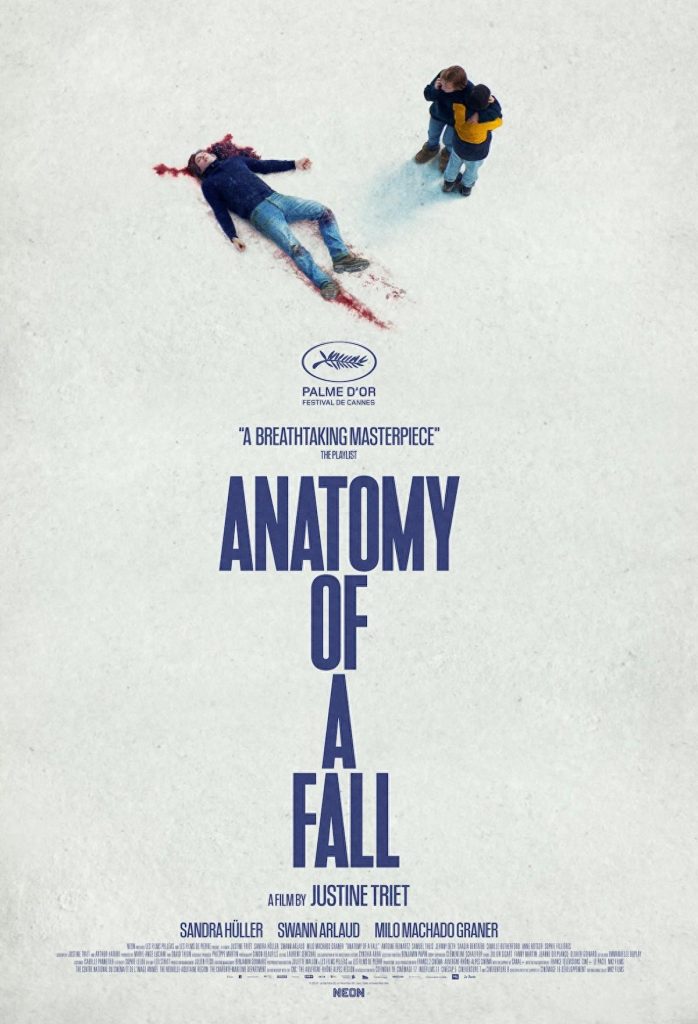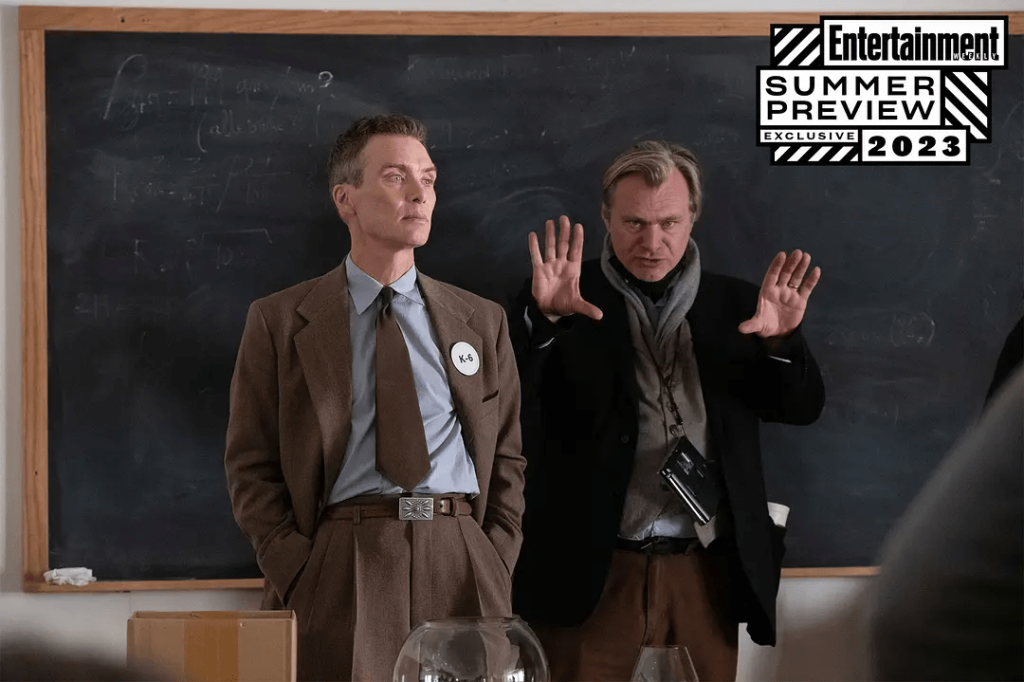“Falling Judgment”, there is no transition, no twists and turns, a calm trial, as if to tear open a hole, inside is the undercurrent, or a huge abyss. The lawsuit did not wait for a peaceful conclusion, and the so-called fair justice can hardly judge the unspeakable and unverifiable life.

Rather than a feminist perspective, the author would like to talk about this 76th Palme d ‘Or film from the perspective of film theory and narratology. The story follows Sandra (Sandra Wheeler), a German writer who is accused of murdering her husband Samuel (Swann Araud).
Their visually impaired 11-year-old son Daniel (Milo Machado-Grana) finds himself faced with an ethical dilemma as the sole witness to the tragedy.
As the truth of Samuel’s death remains murky, the mystery deepens: An accident? Suicide? Kill people? The investigation began, with the court examining the couple’s lives in the context of “social prejudices faced by independent women” and publicly examining recordings of their arguments in court.
As an “eyewitness”, the son is a weak patient, so his testimony is difficult to corroborate; The defendant’s wife, who had to defend herself, used English, a “third language”, not her native German or French, so her testimony became ambiguous in translation.
Sandra is forced to say what she says in another language, and it’s not so much the content of the words that changes as the betrayal of the translation that creates a broader focus on any expression.
It is no small matter that recordings of arguments appear again in the trial, and issues such as assignment, imbalance between home work and “professional” work, parenthood and marital relationships, which should be private for couples, now become so closely related to death that they “have to” be aired as evidence in court.
This is not a documentary about domestic violence, but a new look from the inside at how any ostensibly “intimate relationship” between two people may be intrinsically scary or dangerous.
The story takes place in a single-family cottage in the Alps, where the couple have no neighbors or friends, and the entire fall was not heard or seen by anyone.
In the opening credits we learn that Sandra is a writer like her husband, and that she evades the questions of the student journalists who interview her, which immediately suggests that the “fall” of the title also represents the fall of speech, since the novelist considers speech supreme. “My job is to blur the lines and let fiction destroy reality (c’est de brouiller les pistes pour que la fiction detruise le reel),” she even confided in a television interview that was soon published by the media.
This accident, as a dreary material reality, cuts off the surrounding discourse about the author’s omnipotence and self-fiction. After an investigation, the judge tries to prevent the possibility of establishing “facts” from increasing, and the court evolves into a bloody rhetorical arena – reality no longer exists.
Living between the real and the fake
“What do you want to know?” At the beginning of the film, Sandra asks the student reporter who has come to question her. In fact, the reporter wanted to know what is reality and what is fiction in Sandra’s work, and whether the author believes that we can only invent and create from reality. Sandra’s literature, however, belongs to a genre that might be called autobiographical fiction. The term was first used in 1977 by writer and critic Serge Doubrovsky (to define his story The Son).
It is a mixture of what one might consider transcendental opposites: autobiography and fiction. An autobiographical novel is actually a story inspired by the life of the author of the story, but a story that allows itself to be romanticized, imagined, and does not conform to the standards of sincerity, truth, and truth as we know it.
It is often associated with traditional autobiography (and “autobiographical” as defined by Philippe Lejeune). There are usually two tendencies towards this genre: one is referential, which is based on the eponymous relationship between the narrator, the author and the character, and holds that “autobiographical fiction is a way to deal with reality through fiction”; The other is purely fictional and is considered “fictional rather than autobiographical,” i.e., “self-fictionalized.”
During this trial, Sandra admitted that her autobiographical novel was inspired by elements of her life (particularly her son’s accident, but also her son’s relationship with her husband).
At the beginning of the film, when the reporter tries to distinguish truth from fiction, Sandra evades and deflects the subject of the conversation. However, throughout the film, she must answer questions from police and lawyers before and during the trial. She would have to talk about herself, about her book. So every element of her speech will be dissected, every word said will be analyzed.
Can we analyze real life as we analyze literary works? In interpreting literary works, the question posed is fundamental: Who is talking? (Character or author?) Can we understand the meaning of the excerpt? (taken from a book or an audio recording – the couple’s argument), without connecting it to the broader context? Who decides the meaning of the text (the speaker of the speech? Or the recipient of the speech?) The judge wanted to read excerpts from a book written by Sandra about the thoughts of a character who feels a desire to kill.
This charge apparently makes a similar connection between this passage and Samuel’s death: Sandra foreshadows her murderous desires in her novel. For the defense, this is unacceptable: “You didn’t take context! You’re delusional about a detail! The excerpt has no context, it is just a secondary role and has no real meaning. Even in the genre of literary texts, this is a fantasy rather than a fact.” The defense accused the judge of over-interpreting and making minor passages the core of the book.
The defense insists: We must distinguish the author from the character, and the character’s point of view is not equal to the author. There is a difference between the fictional world (of a character) and the real world (of an author).
“Sandra’s book was part of the trial into which she invested her life, particularly her social relationships,” the judge argued. The defendant’s books are self-narrated and have autobiographical inspiration, so we can make this connection between the characters and the author, they are not entirely fictional. And for the defense, it’s not autobiography but autobiographical fiction, a genre that allows itself to reintroduce fiction to self-writing.
The actual recording of the couple seems to be more convincing than Sandra’s literature. We begin to hear the sound and then move through the film lens to cleverly reconstruct this crucial moment in the image. Thus, we are witnessing the dramatization of the film itself: at its extreme moments, through images, the projection of what, in testimony, is only unspeakable and silent.
The violence is played out by returning to the “sound-only” footage, where the court and the audience hear Sandra’s slap, Samuel’s blows, broken objects, but are unable to connect the body to them. The couple then forms this absent body: off screen (hors de la scene), which points to the whole film and gradually destroys the meaning of the representation.
The gap in time and space opens up the discourse, and each listener has room for his or her own imagination: the couple’s body, torn between intimate tribulations and imagined narratives, the visibility of the recording’s investigation and the invisibility of the experience. In fact, the verdict of this fall is constantly affirmed and denied in the trial, which can be said to be an art of la mise en scene.
But in fact, as in Sandra’s text, the argument was indeed “ambiguous evidence,” as the defense attorney put it. On the one hand, like the quoted text, the recording is just an excerpt, just a moment in two people’s relationship, and does not represent their entire lives.
Sandra put it this way: Recording is not reality, because it is only part of reality. It is indeed their communication, their words, their voices, but not them – not the sum total of all their being, their communication, their interactions, their bodies: we can never grasp the wholeness of a being or a relationship.
On the other hand, we believe a priori that the recording must belong to reality, fact (rather than fiction and statement), knowing that the recording was recorded by Samuel, who tried to create an “autobiographical novel” by drawing inspiration from his wife’s methods.
So aren’t the recordings he made literary works? Who knows if Samuel wouldn’t have sparked controversy in order to provide material for his book? The traditional order – literature comes after life, and the order in which life is recorded and described is reversed: first literature (the desire to write, to perform), then life.
Discourse is between rights
As in documentary films, there is no absolute reality under the lens of the camera; In the same way, can we speculate whether Samuel, who was recording, inevitably mixed performance into the argument? Nothing is known.
During the argument, we hear Samuel scold Sandra for “stealing my time, preying on me, cheating on me.” Yes, this “housewife” type of cry from the husband’s mouth, this father’s fall is not the fall of patriarchy?
Patriarchy requires women to sacrifice their femininity on the altar of marriage and motherhood. This is a typical “Lacanian man” who protects himself – from women who harm the other he represents.
This trial is a test of an inadequate mother. Did she kill her husband? Was it an accident? Or did he kill himself? The autopsy gave no answers. So all of these possibilities are correct.
When the trial begins in a year, two arguments will confront each other and support the experts’ view: suicide on the one hand, murder on the other. This is a test of motherhood, and behind this test is a test of female sexuality. From the beginning of the trial, the Attorney General attacked him on the grounds of sexual orientation.
He called her bisexual – slandering her for being unfaithful, and his tone, bordering on exasperation, showed his obvious prejudice against this woman. She was guilty of infidelity, guilty of independence, guilty of writing. To quote Raul Adler, women who write are dangerous.
Based on this film, we can add: Women who desire are dangerous. In the men’s court, Sandra was guilty. She felt guilty that she hadn’t been a proper mother, she felt guilty that she hadn’t been an understanding wife – and worse, that she didn’t have feelings of sadness, or even that sense of reason and clarity.
As a woman, she is guilty. The otherness is frightening, and we’ve been trying to eliminate the otherness behind the roles we expect them to play. Sandra can speak English, but her French is broken. Language is where the power lies: the court blamed Daniel’s ban on speaking English at home in the presence of his godmother, Maggie Berger.
During the trial Sandra was not allowed to use her own language and was often forced to speak French, which was a difficult language, and her attitude was not understood, but she did not cry, she did not shake. She stood up straight. The director tries to create such characters to make the narrative structure more complete.
In the film, men face the problems faced by women in traditional families, reality solves the problems invented in traditional literature, and the flow of feminist director Justine Treille’s exquisite and poetic lens, perhaps we have been searching for the truth of life between the truth and the false, between the part and the whole, between the self and the other…











